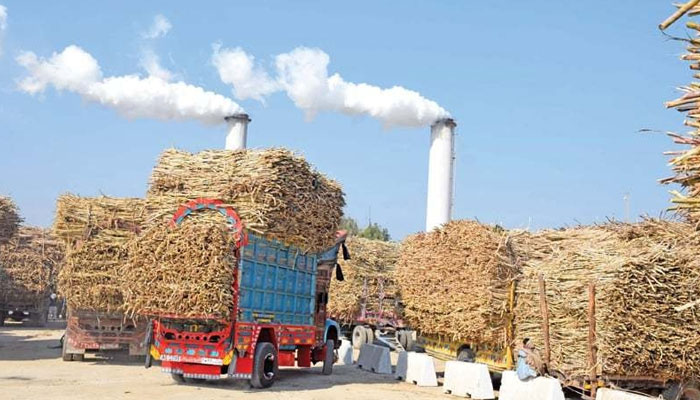Sugar supply chain should be deregulated
ISLAMABAD: The sugar industry, which is known as political industry belonging to both treasury and opposition benches irrespective of political divide, can come out from controversies provided whole supply chain is deregulated with no support of the government.
It was the crux of discussion among economists, researchers, government functionaries, mills owners and others during video conference organised by Pakistan Institute of Development Economics (PIDE) on the subject of Sugar Industry in Pakistan here on Friday.
It was pointed out that more growers were now sitting in Parliament so they exerted their influence to force the provincial governments to fix the support price of sugarcane. It was also stated that the recent sugar report presented by FIA officials belonged to police who did not understand this sector very well so some experts termed this report half cooked.
When the millers are forced to buy sugarcane on fixed prices, how millers will not escalate the sugar prices as excuse for it. The cost audit of sugar millers have been underway by the Competition Commission of Pakistan (CCP) but they are also making a point that the price is determined on the basis of demand and supply so they are going to recommend the government to deregulate the whole sector because when the government does not intervene at any stage, there will be no argument to seek any subsidy at any stage.
The representative of sugar millers Nauman Khan said that they supported the idea before sugar advisory board about 18 months back that this whole sector should be deregulated. Earlier, it was mentioned by former secretary finance Abdul Wajid Rana that the stance of stakeholders got changed inside and outside the official meetings as they opposed it during the official meetings.
But Naumnan Khan said that they would support deregulation. He said that sugar industry was not spreading pollution as he argued that ethanol should be considered as separate industry. He claimed that the government was pocketing more than sugar millers out of selling price at retail levels. He said that the government was collecting Rs15 per kg all taxes including 17 percent GST but according to him the millers were earning less as profit.
He said the prices of sugar were equivalent to other regional economies and only the price was less in Brazil.
Khalid Mirza, former chairman of CCP and renowned expert on competition said that sugar is highly cartelised industry in Pakistan having owned by politicians belonging to political divide. He said that this is commodity like coffee in Latin America. He said that there was solution that let the market forces prevail, as there should be no restriction on import and export. He said that the government should maintain strategic reserves and then do away all kind of restrictions. The government needs to maintain ‘strategic reserves’ in order to avoid exploitation and then there should be no restrictions on movement of sweetener within the country as well as on its imports and exports so the mills owners should make decision purely on commercial terms if wants to stay or leave the business it must be up to them for taking decision.
One expert representing farm sector said that the pricing of water also needs to be looked into as cotton was replaced with water intensive sugarcane crop. On the occasion, Dr Nadeem Ul Haq said that everyone agreed to move ahead with deregulation but the question arises how the policymakers will be pursued to make this desired change. He also criticised the role of media arguing that the media was busy showing infighting among politicians instead of convincing the policymakers to make changes in policy formulation and execution for the betterment of the country.
-
 Prevent Cancer With These Simple Lifestyle Changes
Prevent Cancer With These Simple Lifestyle Changes -
 Experts Reveal Keto Diet As Key To Treating Depression
Experts Reveal Keto Diet As Key To Treating Depression -
 Inter Miami Vs Barcelona SC Recap As Messi Shines With Goal And Assist
Inter Miami Vs Barcelona SC Recap As Messi Shines With Goal And Assist -
 David Beckham Pays Tribute To Estranged Son Brooklyn Amid Ongoing Family Rift
David Beckham Pays Tribute To Estranged Son Brooklyn Amid Ongoing Family Rift -
 Jailton Almeida Speaks Out After UFC Controversy And Short Notice Fight Booking
Jailton Almeida Speaks Out After UFC Controversy And Short Notice Fight Booking -
 Extreme Cold Warning Issued As Blizzard Hits Southern Ontario Including Toronto
Extreme Cold Warning Issued As Blizzard Hits Southern Ontario Including Toronto -
 Lana Del Rey Announces New Single Co-written With Husband Jeremy Dufrene
Lana Del Rey Announces New Single Co-written With Husband Jeremy Dufrene -
 Ukraine-Russia Talks Heat Up As Zelenskyy Warns Of US Pressure Before Elections
Ukraine-Russia Talks Heat Up As Zelenskyy Warns Of US Pressure Before Elections -
 Lil Nas X Spotted Buying Used Refrigerator After Backlash Over Nude Public Meltdown
Lil Nas X Spotted Buying Used Refrigerator After Backlash Over Nude Public Meltdown -
 Caleb McLaughlin Shares His Resume For This Major Role
Caleb McLaughlin Shares His Resume For This Major Role -
 King Charles Carries With ‘dignity’ As Andrew Lets Down
King Charles Carries With ‘dignity’ As Andrew Lets Down -
 Brooklyn Beckham Covers Up More Tattoos Linked To His Family Amid Rift
Brooklyn Beckham Covers Up More Tattoos Linked To His Family Amid Rift -
 Shamed Andrew Agreed To ‘go Quietly’ If King Protects Daughters
Shamed Andrew Agreed To ‘go Quietly’ If King Protects Daughters -
 Candace Cameron Bure Says She’s Supporting Lori Loughlin After Separation From Mossimo Giannulli
Candace Cameron Bure Says She’s Supporting Lori Loughlin After Separation From Mossimo Giannulli -
 Princess Beatrice, Eugenie Are ‘not Innocent’ In Epstein Drama
Princess Beatrice, Eugenie Are ‘not Innocent’ In Epstein Drama -
 Reese Witherspoon Goes 'boss' Mode On 'Legally Blonde' Prequel
Reese Witherspoon Goes 'boss' Mode On 'Legally Blonde' Prequel




